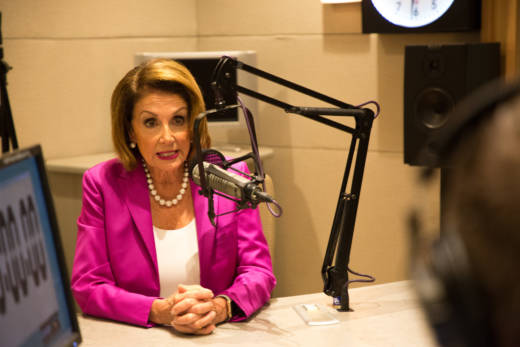Harder, like many Democratic candidates, won't say whether he would support Pelosi for Speaker if Democrats retake the house -- and some Democrats have gone further, vowing not to support her at all.
So what's the future for the 78-year-old Pelosi, a 15-term Democrat who's been enormously successful raising money and keeping her diverse caucus together on important votes but is vilified by the right?
"It's complicated," said Lisa Garcia Bedolla, director of the Institute of Governmental Studies at UC Berkeley.
"On the one hand, she remains probably one most successful speakers in the history of Congress -- I think she has really good relationships with her caucus, I think they trust her, and I think she's been a very able fundraiser," Garcia Bedolla said. "So in a normal situation, would be a no-brainer that she’d be the speaker, given her performance and the capital she has amassed."
But, Garcia Bedolla said, on the other hand Pelosi "has become a boogeyman for the right, which isn't good for the party."
Marc Sandalow, a former journalist who literally wrote the book on Pelsoi, said it's true-- Pelosi may not be popular with Republicans or even some Democrats, but she's very good at her job.
"Pelosi's skill has always been behind the scenes," said Sandalow, who now directs the University of California's Washington, D.C. program. "She's a master operator in terms of figuring out who should get campaign donations, who should run where, who should get certain bills, and serve on certain committees to advance the agenda -- those are not things that are obvious to the public."
The thing is, the American people don't vote on Congressional leaders -- Congress does. And Sandalow says there are three possible scenarios that could play out after Election Day: If Republicans keep the House, it seems unlikely that Pelosi could hold onto power. If Democrats win control by a huge margin, the speakership is likely hers for the taking. But if Democrats take the house by only a small margin, it's a little stickier for Pelosi, Sandalow said.
"If she wants to be speaker of the House, everybody votes including Republicans," he said. "So that means if they start off with every single Republican in the House voting against her which means she can only afford to lose 5, 10, 20 Democrats depending on how many seats Democrats pick up. That's going to be a problem because she has at least that many Democrats who have said they won't vote for her."
But, he added, "There's no obvious successor either."
That lack of an obvious successor is a problem for Pelosi, said Garcia Bedolla.
"There's a sense on the Democratic side that they don't have enough of a bench and part of developing that bench is giving younger members a chance to be in leadership," she said. "One thing she could do better is having a succession plan."
East Bay Congressman Eric Swalwell, a Pelsoi ally, agrees that Democrats need to include more younger members in their leadership ranks. He was the youngest Californian in Congress when he was sworn in at age 32 in 2013 after beating an 80-year-old incumbent, Pete Stark.
Swallwell, now 37, in 2016 ran for and won a seat on Pelosi's leadership team.
"Right now, at our leadership table, I am the youngest one there," he told Political Breakdown this summer. "I would love to have more young voices, and this class that’s running ... we have about 60 of them in the 100-plus competitive seats we have, who are under the age of 40. So I think they are going to come in and they are going to be a block, and they are going to expect to have seats at the leadership table."
But Swalwell also cautioned against ageism: "I think it's not fair to just measure somebody on their age --it's 'Are they effective?'," he said.
For her part, Pelosi has begun signaling that she doesn't plan to stick around Washington forever.
“I see myself as a transitional figure,” Pelosi told the Los Angeles Times just last week . “I have things to do. Books to write; places to go; grandchildren, first and foremost, to love.”
But she's also repeatedly made clear that she has another consideration: Making sure women have a seat at the table. Speaking to KQED's Political Breakdown in August, the minority leader indicated she might have stepped down two years ago if Hillary Clinton had won the presidency.
"I believe I would have walked away from all of this. Anybody who lives in San Francisco doesn't like to get on a plane every week to go to Washington D.C. -- that's for sure," she said, adding, "I know how important it is to have a woman at the table. You cannot just have five people who look very much the same at the table and think that people are going to say, 'Oh my views are represented there'."
Pelosi has brushed off the Republican attacks, telling Democratic candidates that they should do what they need to do to win. But she's also repeatedly expressed confidence that she can win another term as leader of the Democratic caucus -- and in her interview with KQED, she made one thing clear: In her mind, Republicans attack her for one major reason.

